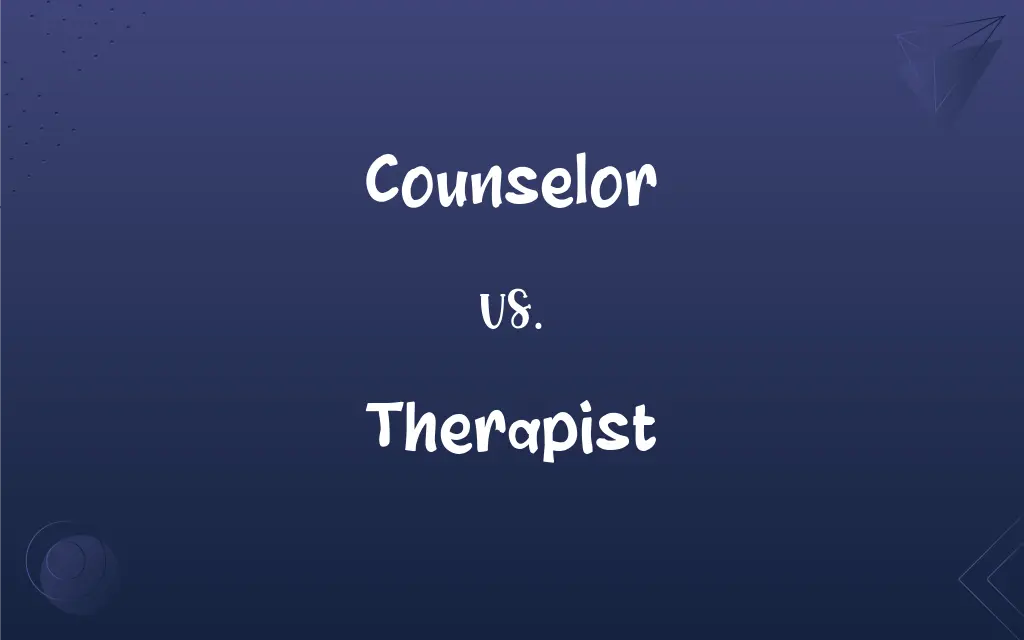Counselor vs. Therapist: What's the Difference?
Edited by Harlon Moss || By Janet White || Published on December 1, 2023
Counselors offer guidance on specific issues and decision-making, while therapists provide deeper psychotherapy for emotional and psychological disorders.

Key Differences
Counselors focus on specific problems, offering guidance and advice, often in educational or career contexts. Therapists, on the other hand, delve into deeper emotional and psychological issues, providing long-term treatment for mental health disorders.
The approach of a counselor is typically more solution-focused, dealing with present issues and practical solutions. A therapist engages in a deeper exploration of a person's past and psychological state to understand and treat mental health conditions.
Counselors often work in settings like schools, colleges, or career centers, addressing situational problems. Therapists, in contrast, are found in clinical settings, addressing chronic or severe mental health issues through psychotherapy.
The educational background for counselors usually involves specialized training in areas like career guidance or education. Therapists are generally required to have more extensive training in psychology or psychiatry, often including a license to practice psychotherapy.
Counselors may provide short-term support, focusing on specific goals or problems. Therapists typically engage in longer-term relationships with clients, addressing complex emotional or behavioral issues over time.
ADVERTISEMENT
Comparison Chart
Focus
Specific issues, guidance, and decision-making.
Deeper emotional and psychological disorders.
Approach
Solution-focused, present-oriented.
Deep exploration of past, long-term therapy.
Work Setting
Schools, career centers.
Clinical settings, mental health facilities.
Training
Specialized in guidance, education.
Extensive in psychology, psychotherapy.
Relationship Type
Short-term, goal-oriented.
Long-term, complex emotional issues.
ADVERTISEMENT
Counselor and Therapist Definitions
Counselor
A person trained to give advice on educational or career choices.
He saw a career counselor to discuss his job options after graduation.
Therapist
A healthcare professional specializing in physical therapy.
The physical therapist developed a rehabilitation plan for his injury.
Counselor
A professional who provides guidance on personal, social, or psychological issues.
The school counselor helped her decide on the right college major.
Therapist
An individual providing specialized treatments like occupational or speech therapy.
An occupational therapist assisted in her recovery after the stroke.
Counselor
An advisor in a camp or organization, often working with young people.
She worked as a counselor at a summer camp for children.
Therapist
A practitioner of psychotherapy, helping clients explore and resolve deep-seated issues.
His therapist helped him work through childhood trauma.
Counselor
A professional in a school setting assisting students with academic and personal issues.
The high school counselor helped him deal with his test anxiety.
Therapist
A professional trained in treating emotional and psychological disorders.
She began seeing a therapist to cope with her anxiety.
Counselor
A legal advisor, especially in a court of law.
The defendant consulted her counselor before the trial.
Therapist
A clinician offering therapeutic interventions for mental health conditions.
The family therapist worked with them to improve communication.
Counselor
A person who gives counsel; an adviser.
Therapist
A person who specializes in psychotherapy.
Therapist
A person who specializes in any of various other medical or psychological therapies
A speech therapist.
A physical therapist.
Therapist
Someone who provides therapy, usually professionally.
Therapist
A psychotherapist specifically.
Therapist
A person skilled in a particular type of therapy
FAQs
Can a counselor diagnose mental health conditions?
Generally, counselors focus on guidance and may not diagnose mental health conditions.
What does a therapist do?
A therapist treats emotional and psychological disorders, often through psychotherapy.
What is a counselor?
A professional offering guidance on specific personal, social, or psychological issues.
Can therapists prescribe medication?
Only psychiatrists, a type of therapist with medical training, can prescribe medication.
What education is required for a counselor?
Counselors typically need specialized training in guidance, education or related fields, often including a master's degree.
Do counselors work in schools?
Yes, counselors often work in educational settings, like schools and colleges.
What is the difference between a counselor and a therapist?
Counselors offer guidance on specific issues, while therapists provide deeper psychotherapy for emotional and psychological disorders.
Do counselors offer therapy?
Counselors may offer therapeutic advice but usually don't provide deep psychotherapy like therapists.
Is counseling short-term?
Counseling can be short-term, focusing on specific issues or goals.
Is therapy provided by a therapist long-term?
Yes, therapy with a therapist can be long-term, focusing on deep-seated psychological issues.
Can a counselor help with career advice?
Yes, career counselors specialize in providing guidance on career choices and development.
What types of problems do therapists address?
Therapists address a range of emotional and psychological issues, including anxiety, depression, and trauma.
Are therapists qualified to treat severe mental illnesses?
Yes, especially therapists with specialized training, such as clinical psychologists or psychiatrists.
Are therapists always licensed?
Yes, therapists generally require a license to practice, especially in clinical settings.
What skills are important for a counselor?
Key skills include empathy, communication, problem-solving, and an understanding of human behavior.
Can counselors provide support for personal issues?
Yes, counselors often help with personal issues like relationships, stress, and self-esteem.
How does a counselor differ from a psychologist?
While there's some overlap, psychologists typically have more training in psychological testing and research.
Can therapy change a person's behavior?
Yes, therapy can help individuals change behaviors, especially when dealing with habits, reactions, or coping strategies.
Do therapists only work in mental health clinics?
While many therapists work in clinics, they can also be found in hospitals, private practices, and other settings.
What therapeutic approaches do therapists use?
Therapists may use various approaches, including cognitive-behavioral therapy, psychoanalysis, and humanistic therapy.
About Author
Written by
Janet WhiteJanet White has been an esteemed writer and blogger for Difference Wiki. Holding a Master's degree in Science and Medical Journalism from the prestigious Boston University, she has consistently demonstrated her expertise and passion for her field. When she's not immersed in her work, Janet relishes her time exercising, delving into a good book, and cherishing moments with friends and family.
Edited by
Harlon MossHarlon is a seasoned quality moderator and accomplished content writer for Difference Wiki. An alumnus of the prestigious University of California, he earned his degree in Computer Science. Leveraging his academic background, Harlon brings a meticulous and informed perspective to his work, ensuring content accuracy and excellence.






































































